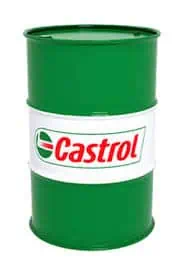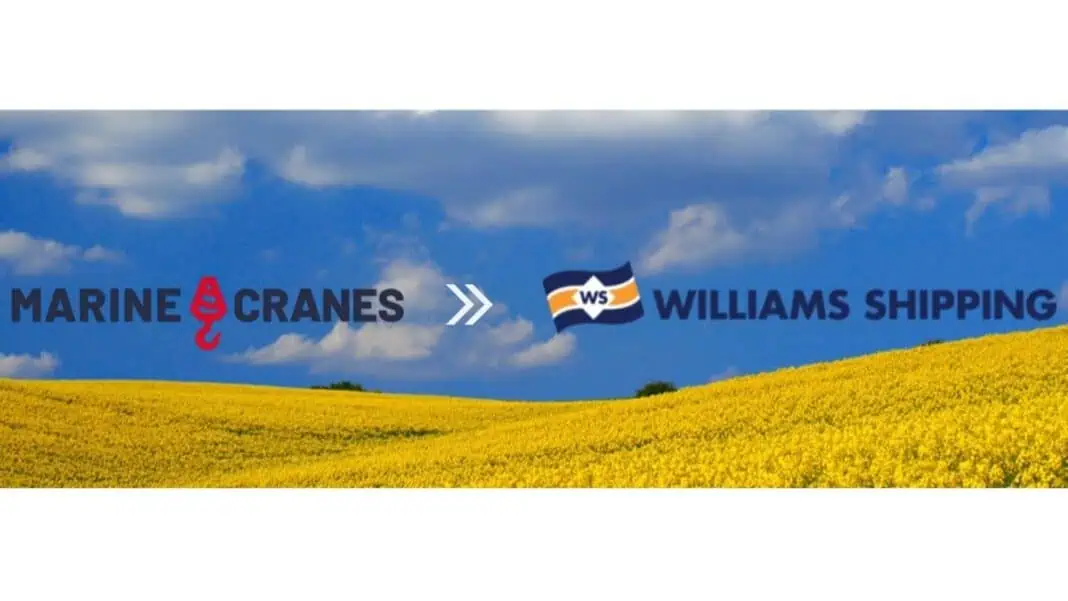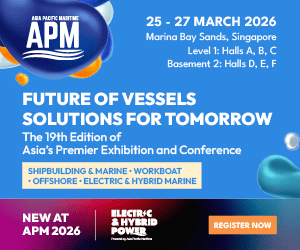As the maritime industry faces growing pressure to adopt sustainable practices, Marine Cranes and Williams Shipping have joined forces to explore eco-friendly alternatives for vessel operations. One key solution under discussion is the transition from conventional petroleum-based hydraulic oils to bio-oil in marine cranes.
However, uncertainty around the use of bio-oil remains. Marine Cranes and Williams Shipping are on a mission to clarify questions of compatibility, performance and longevity, debunking myths and encouraging others in the industry to make the more sustainable choice. The partnership will draw on both companies’ experience to share their combined knowledge with the industry and customers.
In this article they explore the use of bio-oil and to discuss if making the switch from synthetic oil in your cranes is worthwhile.
Ben Pym, Managing Director at Marine Cranes says, ‘We’re asked by customers about the use of bio-oil and it is clear there is still some uncertainty around compatibility, performance and longevity. Knowing that Williams Shipping is an advocate and first mover in the use of bio-oils we have spoken to them at length about their experiences’.
Dan Freeman, Head of Business Development at Williams Shipping added, ‘We’ve been using bio-oil across all our vessels for over six years now. Consequently, we have real experience in how it compares to traditional oil, backed up with data from our testing regime that really helps to illuminate the discussion. By partnering with Marine Cranes we hope it will encourage others in the industry to consider making the switch to more sustainable products.’
Firstly, the Basics: Mineral Oil vs Bio-Oil, an Essential Comparison.
Mineral oils are a complex mixture of hydrocarbons derived from crude oil. Due to their long carbon chains, they are non-polar (or hydrophobic) and highly stable, and unfortunately, it is these qualities that make them resistant to biodegradation. The extraction, processing, and utilisation of mineral oil are well-known contributors to carbon emissions, particularly during the extraction of crude oil, a finite and non-renewable resource.

Bio-oils, such as Castrol BioBar, are made from synthetic esters, engineered by reacting fatty acids with polyols or alcohols. Their polar nature (hydrophilic) makes them biodegradable, which gives them the environmental advantage. Bio-oils come from renewable sources and have a significantly reduced carbon footprint. Although their impact varies depending on the source, Castrol BioBar for example, is independently verified as carbon neutral, which includes the packaging.
In the past several years the development of sustainable oils has been a key focus of petrochemical companies. This has led to significant improvements in their applicability and performance although a widespread shift is use it still is yet to happen.
Seal Compatibility: The Myth Debunked
A common concern regarding the use of bio-oils in a crane’s hydraulic systems is in the degradation of rubber and plastic seals and gaskets over time. This was the case for older, first-generation bio-oils which would react with materials like nitrile rubber (NBR), leading to premature leaks, and a requirement to replace hardware prematurely. To address this, more chemically resistant seals made from fluoroelastomer (FKM) were introduced. These have greatly improved long term compatibility, though FKM can be sensitive to wear if water contamination is present, so fluid condition still needs to be monitored. Dan Freeman, from Williams Shipping adds, ‘Seal issues no longer needs to be a concern, providing oil hygiene is carried out to reduce water contamination, thereby preventing hydrolysis.’
Ben Pym from Marine Cranes adds, ‘Whilst formal OEM approvals for deck equipment are still growing, partly because there is no strict regulatory requirement yet, most major brands now publish seal compatibility data. So, whilst it’s always wise to check the crane’s specification sheet, there’s little need to be concerned that bio-oils will damage the equipment on your crane, if matched with a high-quality bio-oil.’
In addition, modern bio-oils are engineered for stability and compatibility. With additives such as anti-wear agents, antioxidants, and anti-hydrolysis compounds, modern bio-oils now offer a superior performance to mineral oils without compromising sustainability.
Dan Freeman continued, ‘In our experience, bio-oil actually delivers a better performance, when compared with standard synthetic products and with good maintenance and regular testing longevity is actually greater.’
Regulatory Push
There is a clear regulatory shift underway in the UK and globally. The UK Environment Agency now treats oil discharges with increasing seriousness, and even small pollution incidents can result in serious fines.
Many UK ports have begun encouraging the use of biodegradable hydraulic oils, to reach their net-zero goals. The UK is also party to the OSPAR Convention, which promotes the use of Environmentally Acceptable Lubricants (EALs). There are now a number of marine bio-oils that meets the OSPAR standards and are considered an EAL.
Why Cheaper Oil Might Cost You More
One concern for many vessel operators is the cost, which should be explored in detail to ensure a full picture is understood. Typically, mineral oils are significantly cheaper, often costing around £2 – £4 per litre depending on the brand or product. On the other hand, bio-oils cost around double at £5 to £10 per litre. If we take a 25L drum for example, this is around a £110 difference. And whilst this can raise some immediate concerns for vessel owners, it only tells part of the story.
Every 12 months, crane manufactures recommend you replace your hydraulic oil. At this point, operators should consider disposal. Mineral oils are classified as hazardous waste, meaning they must be handled by licensed contractors under strict environmental regulations, making disposal a complex and costly process. Biodegradable bio-oils on the other hand are non-toxic and break down naturally in the right conditions within around 28 days, which simplifies the disposal process and reduces costs. In some cases, bio-oils may be considered for recycling or waste to energy schemes depending on contamination level.
Oil spills involving mineral oils can be both environmentally damaging and financially costly due to complex cleanup procedures and potential regulatory fines. In contrast, bio-oils break down more readily, which makes spill response simpler, quicker, and significantly cheaper. Since many bio-oils are VGP or OSPAR compliant, their use also reduces the risk of fines.
Ben Pym further commented, ‘With all this considered, while the upfront cost of bio-oils may be higher, the long-term savings on disposal and spill management means they start to look much more attractive from a financial point of view. It is therefore worth looking at the disposal and historical costs incurred due to spills before ruling out bio-oil on costs grounds.’
Conclusion
With a few simple checks, switching your crane hydraulics to bio-oil is now a real option, without the risk of seal degradation, provided water contamination is minimised through good oil hygiene. And it may bring more than just green credentials and a clearer conscience. They offer better performance, lower risk and with tighter regulations, rising disposal costs, the case for bio-oils is stronger than ever.
Marine Cranes now offering its customers bio-oil for use in their new cranes and can review the suitability for bio-oil in existing models on request.
About the organisations
Williams Shipping Group, founded in 1894, is a trusted provider of marine and logistics services across the UK. With operations in Southampton and Milford Haven, the company offers vessel charter, port services, transport, and marine lubricants.
Marine Cranes is a Southampton-based specialist in the supply, commissioning, and servicing of cranes for vessel, dockside, and offshore applications.













